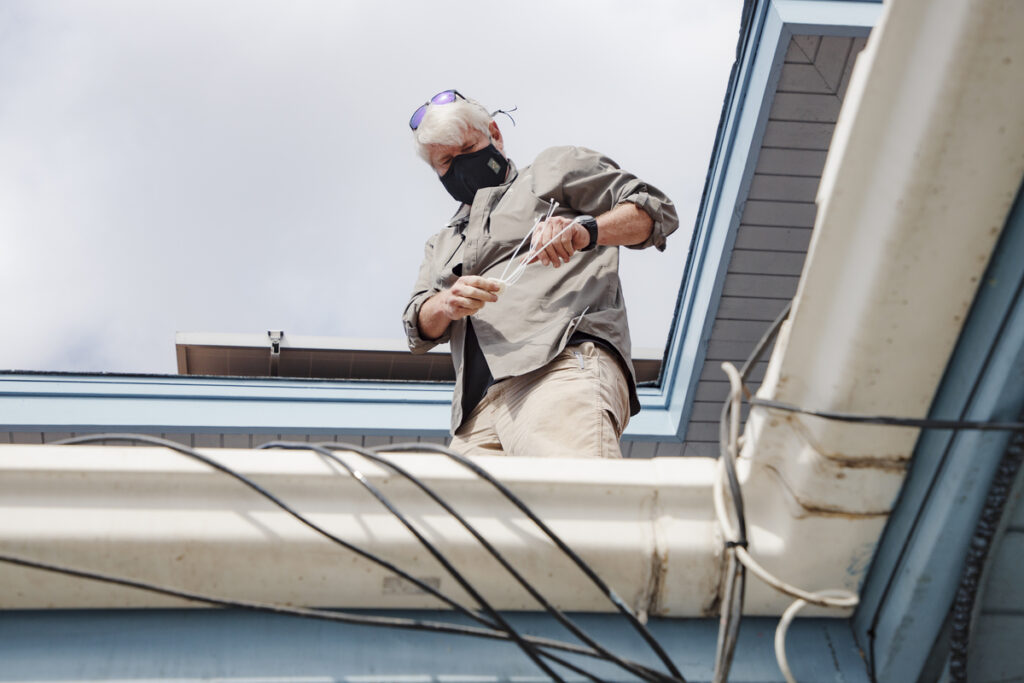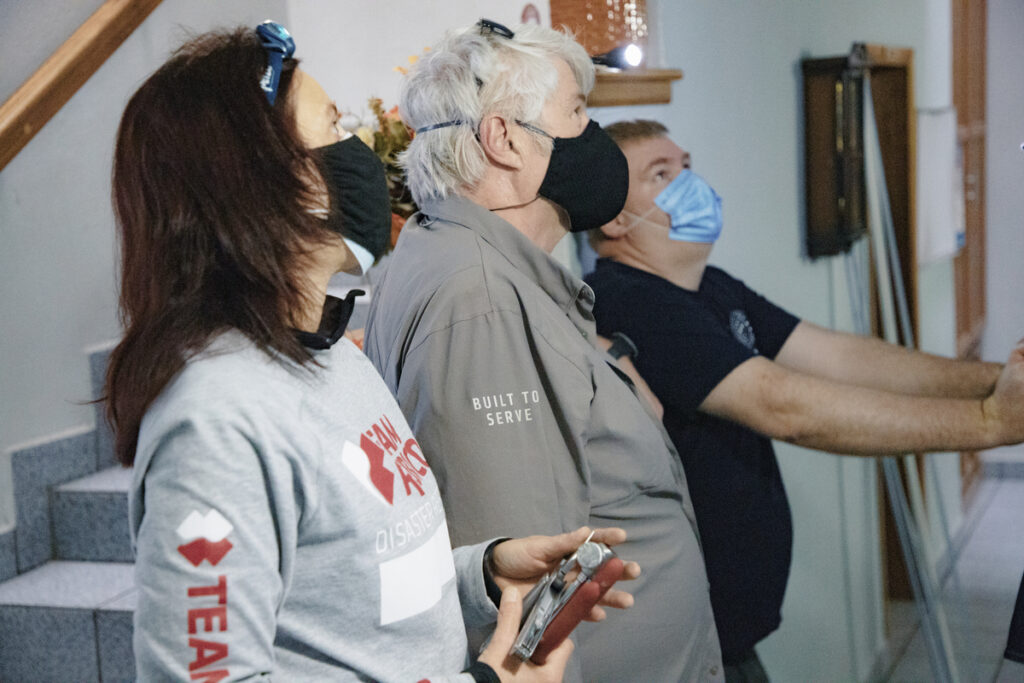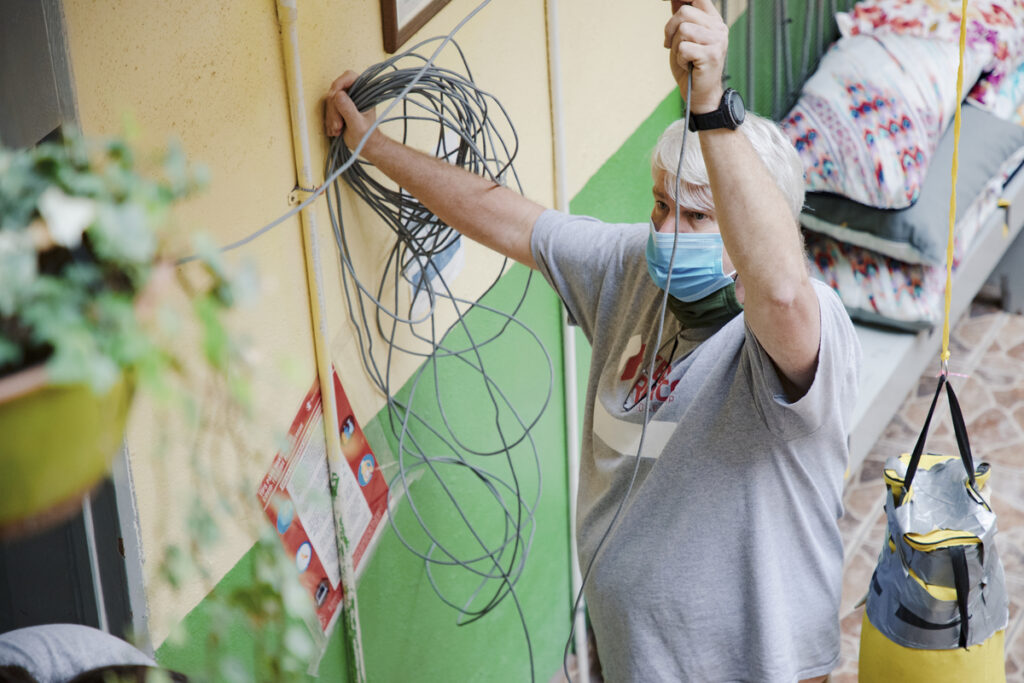It was winter, still warm in Mexico, and around Tijuana men and women in grey shirts were knocking on doors and laying internet cable. Soon, migrants fleeing violence, drought, and poverty from across Central and South America would have a way to communicate with loved ones at home—and to learn about the coronavirus pandemic and how to stay safe.
Those volunteers clad in grey were from Team Rubicon, the U.S. disaster relief nonprofit founded by veterans after the earthquake in Haiti in 2010. In conjunction with NetHope, the NGO whose nearly 60 nonprofit members work together to develop, evaluate, and deploy technology to ameliorate humanitarian crises, they were laying the groundwork for the delivery of safe, secure information and communications services. In this case specifically, broadband that could be used, for free, by migrants and refugees.

Program planning and groundwork was laid in 2020, but when Team Rubicon and NetHope arrived in country in Mexico in early 2021 they discovered much of the equipment they had planned to install remained tied up in customs—perhaps a not-unusual phenomenon given the supply chain disruptions common during the COVID-19 pandemic. So, while the organizations awaited the arrival of the last-mile technology that would activate the service—think routers and modems—Greyshirts like Tiffany Taveras visited sites across Tijuana that provide assistance to migrants. There, they introduced themselves, explained they were there to provide free, secure internet service, and determined what was needed to make the plan a reality. Then, they laid the initial technological framework—the actual cable—that would set the project up for activation once customs was cleared. All of which would give often at-risk migrants access to communication with the people they loved, as well as needed information.
In May, that dream became a reality as NetHope began installing and activating the minute cellular modems across Tijuana.
“We are installing networks in centers—not camps, like for U.N. or something. These centers are more like stations that are put up by other NGOs. There, we provide free internet service for everyone that comes in so they can at least send emails or call people on WhatsApp. It brings a little normalcy to their life, and gives them added security, that they can connect and talk to everyone,” explains NetHope’s Ingolfur “Ingo” Haraldsson. The Cisco-based systems also provide additional levels of security. “We are trying also to steer people toward the right and correct information and block misinformation away from our networks. Users get more secure networks without malware and viruses.”

For Taveras, a longtime Greyshirt who had jumped over to NetHope to help bring the project to fruition, an installation at a community clinic stood out. While the clinic typically provides prenatal care, legal services, rapid HIV and tuberculosis testing, and other social and medical services to the local community, it had also opened its doors to migrants and homeless people allowing them to call home, connect with others, and do research. While such communication is a vital service, it’s also one that takes significant time away from the kind of care the staff can provide.
Yet, to the clinic, providing migrants and homeless citizens with access to communication vehicles, like the internet or WhatsApp, is lifesaving care. So, upon learning that Team Rubicon and NetHope would be installing WiFi and wide area access points, broadband devices in the area, they requested an implementation themselves. Once installed, anyone in the community would have access to WiFi not only when the clinic is open, but 24 hours a day.
“Now, they can call home whenever they want, they can bring a computer to the sidewalk and do whatever they want, whether the clinic is open or not,” explains Taveras, “and that’s really what touched me.”

The Tijuana operation was not the first for Team Rubicon and NetHope, nor will it be the last. In May, volunteers deployed to Juarez, Mexico where Team Rubicon and NetHope set up infrastructure to provide internet connectivity to vulnerable migrant shelter populations and also to humanitarian organizations supporting them. This summer, the nonprofits expect to team up in Brazil where they will set up internet access points that will help provide communication services to some of the more than 285,000 refugees seeking asylum as they flee turmoil in Venezuela.
“One of NetHope’s goals is to ensure that people can communicate,” says Taveras. “It’s just like food and water, it’s right up there with food and water. It’s a human right to have communication. In some places, Internet access has been recognized as a right.”
In installing the infrastructure and ensuring access to communication for everyone, Team Rubicon and NetHope are also helping improve the physical safety and mental health of the most at-risk, such as the homeless, migrants, and refugees on the move.



